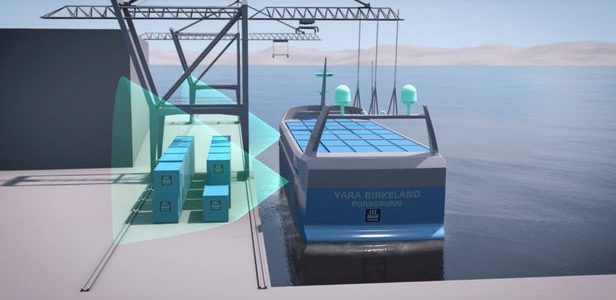The world’s first fully electric container vessel, YARA Birkeland, will begin making manned voyages from the YARA production plant in Porsgrunn, Norway to Brevik and Larvik in 2018. The vessel is expected to begin making remote operated trips in 2019, finally becoming fully autonomous in 2020. Expected to reduce CO2 emissions by removing 40,000 trucks from the route connecting these cities, YARA Birkeland is a paradigm shift in an industry fraught with discussion on sustainability.
“Every day, more than 100 diesel truck journeys are needed to transport products from YARA’s Porsgrunn plant to ports in Brevik and Larvik where we ship products to customers around the world. With this new autonomous battery-driven container vessel we move transport from road to sea and thereby reduce noise and dust emissions, improve the safety of local roads, and reduce NOx and CO2 emissions,” says Holsether.
KONGSBERG developed the technologies enabling the complete automation of the YARA Birkeland including the sensors, electric drive, battery and propulsion control systems. The hope is that not only does the electric automation alleviate the environmental impact of container shipping, but that it can decrease road wear and traffic congestion as it shifts transportation from roads to seaways.
“By moving container transport from land to sea, YARA Birkeland is the start of a major contribution to fulfilling national and international environmental impact goals. The new concept is also a giant step forward towards increased seaborne transportation in general,” says Geir Håøy, President and CEO of KONGSBERG.
It’s another step toward fully automating our seaways, though completely unmanned ocean transport is still quite a while down the road. The obvious regulatory, safety and environmental hurdles will need thorough review and preparation, but we at Nelson International are excited about the prospect of one day, maybe sooner than we originally expected, welcoming the first fully automated, unmanned container ship here at the Port of Virginia.


Comments are closed.